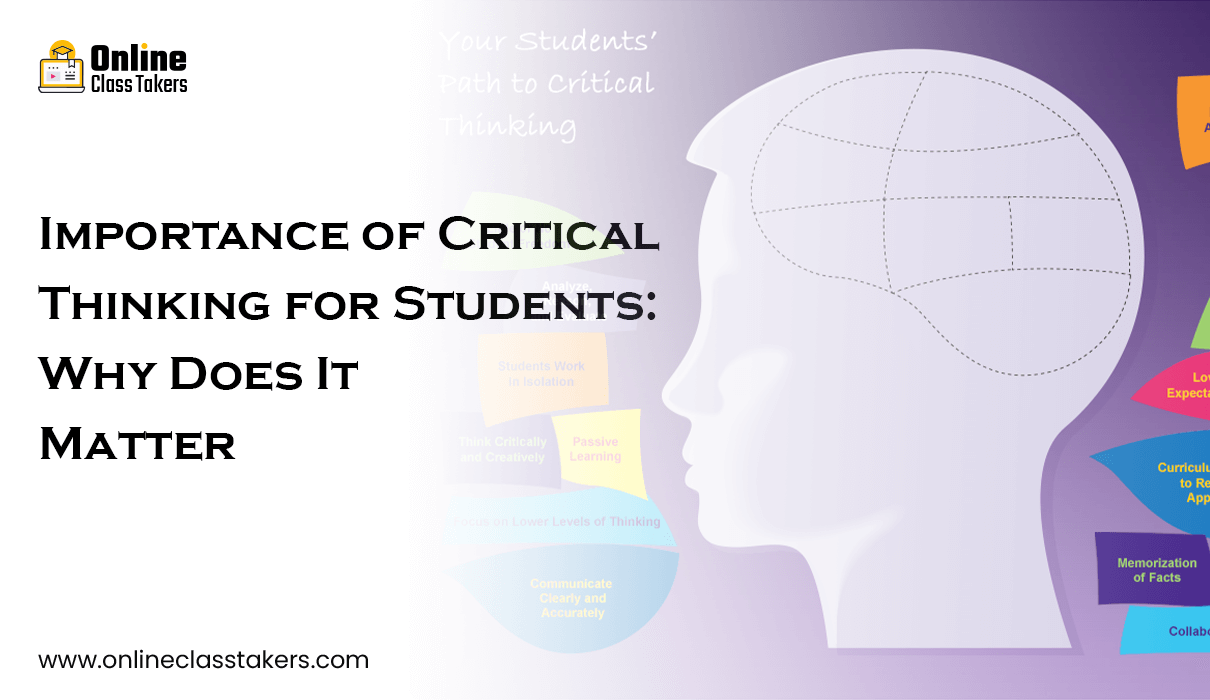Introduction
What Role Does Critical Thinking Play?
Since critical thinking enables students to consider and understand their points of view, it is fundamental to learning.
This skill helps learners figure out how to interpret the world around them based on introspection and comprehension.
Critical Thinking: What Is It?
It is a gloomy perspective that many have that being critical is synonymous with being ordinary.
To put it off, rather than taking one’s own opinions as substantial evidence, people can examine their thought processes and provide evidence to support their positions.
Strong critical thinkers will investigate the material’s sources, question the provided facts, and reject any illogical or unscientific reasoning.
They are knowledgeable, able to weigh the importance of debate and draw cautious, fact-based decisions.
Because it liberates them from personal and societal bias while writing essays and other assignments, students regard it highly.
Critical Thinking Skills for Students and its Benefits in Professional and Personal Life?
As we know the benefits of critical thinking for the personal and professional lives of students are listed below. Through this list, students can realize how important critical thinking is.
The Secret To A Successful Career
A lot of Job Routes Involve Critical Thinking.
Other than scientists different professions need the application of critical thinking including attorneys, doctors, media workers, engineers, accountants, and analysts, to name a few.
However, according to the World Economic Forum lists critical thinking as one of the most valuable skills for employees to possess. because it makes data analysis, creative problem-solving, original ideas, and thorough planning easier.
Boosts Curiosity & Creativity
Widely diversified in their interests, critical thinkers are inherently intrigued about all aspects of life.
Critical thinking involves asking a lot of questions and always wanting to know the answers to questions regarding what, why, who, what, when, where, and everything else that can help make sense of a situation or idea.
Improves Capabilities for Research
You can enhance your research skills by using critical thinking to observe, analyze, synthesize, and carry out in-depth experiments with each component for successful outcomes. These days most of the students are asking to do my online class for me.
Boosts Independent Learning
We believe more independently when we reflect deeply because we have greater confidence in ourselves. The ability to think critically is crucial for enabling students to form opinions and make decisions. Stills I need someone to take my online class.
Be an Effective Communicator
You might think that having strong opinions can ruin relationships, yet this couldn’t be further from the reality!
However, you can become more receptive to diverse viewpoints and more adept at understanding the opinions of others by developing your critical thinking skills.
Address Issues
For people who possess critical thinking skills, fixing problems comes naturally to them.
Problem-solving skills and attentiveness characterize critical thinkers.
Because of their superior problem-solving skills, critical thinkers can solve the most difficult issues in the world and succeed in their careers. Therefore, they have the power to improve the planet.
Comprehend Data
However, it is important to take data more seriously than others is a sign of a critical thinker.
Hence you would learn how to evaluate information. It will help you filter the vital facts from the unnecessary ones.
Make Choices
It’s undeniable that the best decisions are made by critical thinkers.
We can deal with everyday problems by using critical thinking, which is frequently done unconsciously.
Aids in the Analysis of Arguments
Argument Analysis is a Difficult Talent to Master.
However, critical thinking makes you receptive to new ideas. You can analyze the argument more effectively than others because you have multiple points of view.
Encourage Students to Pose Pertinent Questions
Asking as many questions as you can will also help students develop their critical thinking skills because it will compel them to enquire about a variety of subjects.
However, a person’s knowledge of a subject is improved and any uncertainties they may have had are dispelled when they make asking questions a habit.
Additionally, this improves the student’s capacity for situation analysis. Critical thinking skills will significantly increase. This is when every subject is analyzed from multiple perspectives.
Why is it that Pupils Need to be Critical Thinkers?
Critical thinking is vital for students because it equips them with the skills necessary to evaluate, analyze, and reason logically from the vast amount of information they encounter on their own.
Kids are constantly exposed to a wide range of opinions, facts, and debates as our world gets more information-rich and changes swiftly.
With the use of evidence-based reasoning, students can discern between opinions and facts and assess the validity and relevance of the information they are given.
Additionally, it helps students develop their problem-solving skills by pushing them to approach difficulties. Along with an inquisitive and open perspective rather than relying just on rote memorization or passive acceptance.
These critical thinking abilities ensure that students contribute to lifelong learning and lay the groundwork for lifelong learning as they enter higher education and the workforce.
Critical Thinking is Essential in Academic Life.
Critical thinking is essential for enhancing the breadth and caliber of learning in the academic setting.
The academic domain is distinguished by intricate concepts, conflicting hypotheses, and an extensive collection of facts.
To effectively traverse this environment, students need to be able to assess the facts, identify logical links, identify biases, and question presumptions.
Therefore, by critically interacting with academic texts, students can gain a deeper understanding of the material instead of just memorizing facts.


